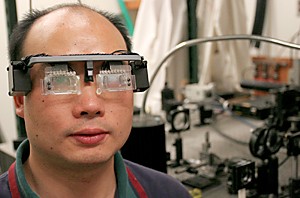One innovation by UA scientists could make bifocals a thing of the past.
A team of optical scientists has developed electroactive glasses that can change focus with a flick of a switch, though they are working to improve the technology before it hits the market.
“”Basically we want to provide a better solution for prescription and myopic eyes,”” said Guoqiang Li, the lead writer on the project. “”The current solution is the bifocal and trifocal lenses.””
The condition of presbyopia occurs with age when the eye muscles start to lose their focusing power, a condition that can be remedied by wearing multifocal lenses. Presbyopia is the most common eye problem and affects everyone in some form by age 51.
But these new glasses could reduce the headache brought on by tilting one’s head to gaze through a bifocal lens.
“”Some people feel dizzy or uncomfortable with eyeglasses,”” said Li, also an optical science assistant research professor.
The new eyewear adjusts the focus of the entire aperture, the entire viewing area of the lens, rather than the small sliver of a lens in a bifocal, Li said.
The secret to switching focus lies in the electrically charged liquid crystals sandwiched between two panels of glass. When the proper voltage reaches the crystals, they change the refraction index, mimicking a lens, Li said.
The glasses currently have two settings; on and off, Li said.
When the device is turned off, it allows the wearer to see things at a distance, the way normal glasses would. When they are turned on, the glasses automatically switch to a comfortable reading focus, Li said.
The next step in the project is to develop multiple focus powers, the equivalent of a trifocal, Li said.
Another objective of the project is to do away with the on/off switch altogether and develop a “”smart”” rangefinder that can automatically zero in on an object, much the same way a camera works, said Nasser Peyghambarian, an optical science professor and project leader.
“”What’s next is we need to develop an autofocus,”” Peyghambarian said.
Peyghambarian, himself a bifocals wearer, said the new developments would present people an alternative to laser eye surgery or conventional multifocal glasses.
PixelOptics, Inc., a Virginia-based company, holds the patents for the electroactive glasses and plans to market the devices sometime in the near future, said CEO Ron Blum.
“”The UA optical science center has done an outstanding job for us,”” Blum said. “”We’re just thrilled to have them as a research partner.””
Blum said he didn’t know when the product would hit the market because the glasses are still in the development phase.









